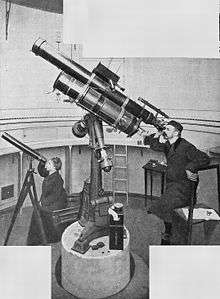Gavriil Adrianovich Tikhov

Gavriil Adrianovich Tikhov (May 1, 1875 – 1960) was a Soviet astronomer who was a pioneer in astrobiology and is considered to be the father of astrobotany. Tikhov worked as an observer at the Pulkovo Observatory from 1906 until 1941. After undertaking an expedition to Alma-Ata (now Almaty) to observe a solar eclipse, he remained and became one of the founders of the Kazakhstan Academy of Sciences.
He invented the feathering spectrograph by using the commonly occurring chromatic aberration to his advantage. By installing a ring-shaped diaphragm in front of the objective he enabled an observer to deduce the color and spectral class of a star very easily. He was one of the first to use color filters to increase the contrast of surface details on planets. He was appointed head of Astrobotany in Alma-Ata, and investigated the possibility of life on other bodies in the solar system.
The crater Tikhov on the Moon, the Martian crater Tikhov, and the asteroid 2251 Tikhov are all named in his honor.